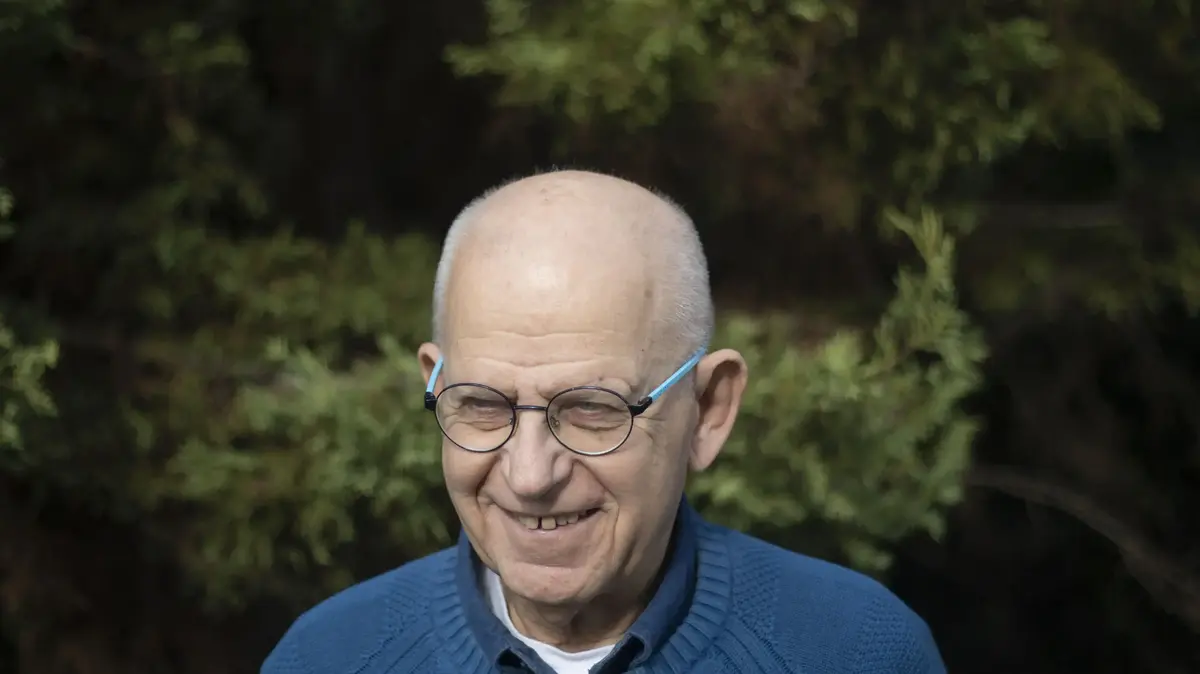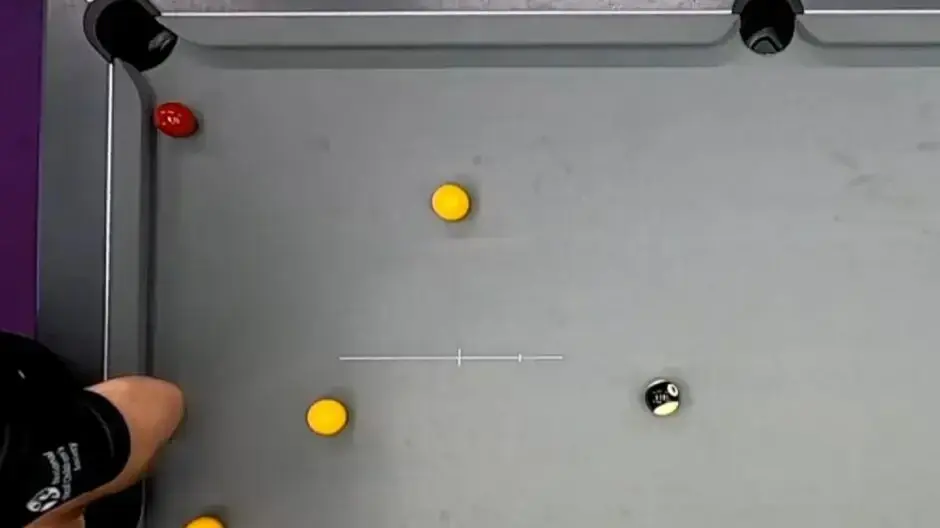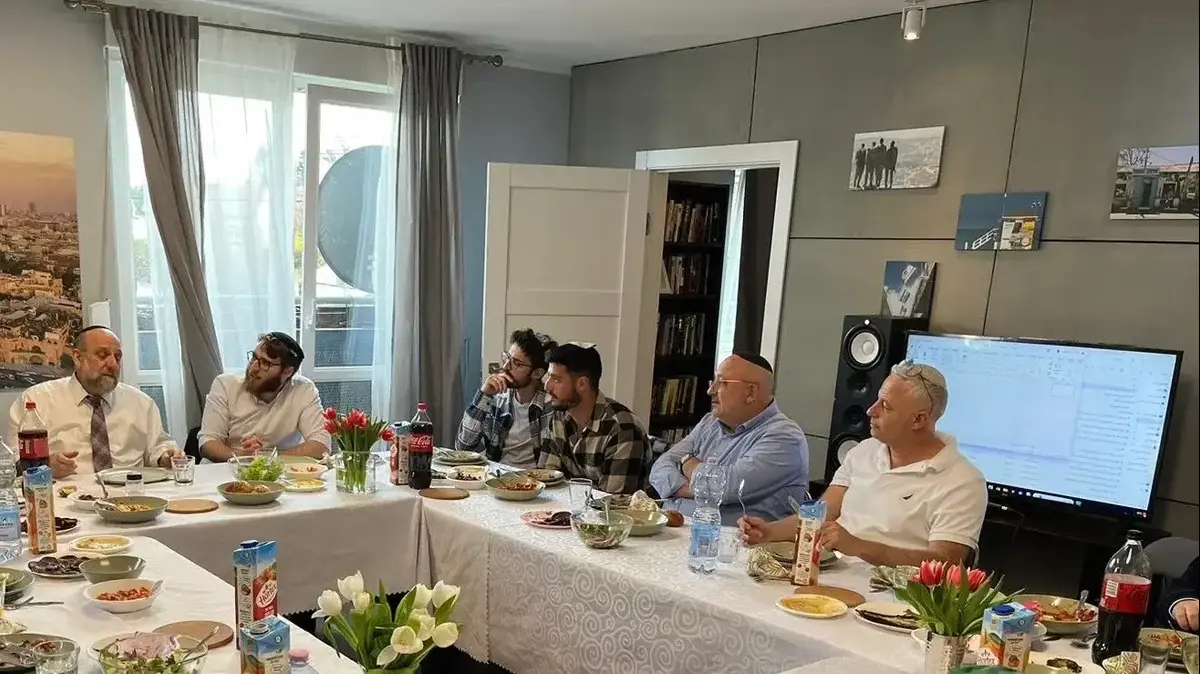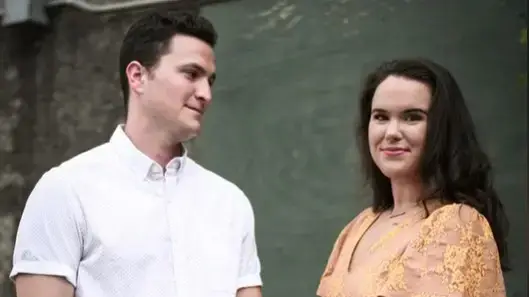Morris hid when his parents were sent to Auschwitz. He only found out the truth about his mother after years
To mark the anniversary of the liberation of Auschwitz, a new exhibition in Germany presents the portraits of 75 Holocaust survivors. One of them, Maurice Glock, was only three when he was handed over to a Christian family in Brussels, where he forgot his language and identity until he was reassembled by his family at the end of the war. "Don't forget but try to forgive"
Morris hid when his parents were sent to Auschwitz. He only found out the truth about his mother after years
Photo: Airports Authority, Edit: Amit SimchaShortly before being taken by Nazi soldiers in Belgium and deported to Auschwitz in 1942, three-year-old Maurice Glock's parents left him under the care of a local Christian family. Glock forgot his mother tongue, Yiddish, as well as the fact that he ever had his own parents.
After the war, his father came to demand him back. A few months later, the father introduced him to a weeping woman, who hugged and kissed him. "My dad said, 'Look Morris, this is your mother, Helen,'" Glock recalls today, in an interview with the Associated Press. Just a few years after the family reunification, Glock discovered that his real mother had perished, along with more than one million other Jews in the Auschwitz extermination camp. Helen was actually his aunt. "She found out her sister was dead and was immediately looking for ways to find me," Glock concluded, gasping for tears. "She was my only mother and she will always be my mother."
Seventy-five years after the liberation of the extermination camp, Glock is one of 75 Holocaust survivors who participated in the Yad Vashem Memorial Photography Project and the award-winning German photographer Martin Schuler. The exhibition, opened this week by Chancellor Angela Merkel at the museum located in the former Coal Mine coal mine in the German city of Essen, is just one of the events marking the anniversary of the camp's liberation and commemoration of its victims, while its few survivors are dwindling. At the same time, Yad Vashem is also unveiling its web site, iRemember, an interactive platform in six languages that brings together victims' information.
More in Walla! NEWS
Instructors in Poland testify: Jewish bones floating in extermination camps Museum in Germany: We will reveal photos to prove - Damianiuk was in Sobibor at the age of 92, she first met with Jewish brothers who rescued in the Holocaust want to remove laser glasses? You no longer have to decide where content is being promotedLives in hiding as a little boy. Maurice Glock (Photo: Ariel Schalit, AP)
Maurice Glock, a Holocaust survivor who grew up in hiding in Brussels, at his home in Target, January 2020 (Photo: Ariel Schalit, AP)
In Israel this week marks the 75th anniversary of the liberation of Auschwitz as part of the World Holocaust Forum hosted by President Reuben Rivlin in Jerusalem, entitled "Remembering the Holocaust, Fighting Anti-Semitism", attended by 41 leaders from around the world. It is the largest international conference in the history of the country. The incident is happening in the background of a global surge in violence against Jews, while 80% of European Jews feel uncertain on the continent, according to a recent survey.
Researchers at Tel Aviv University reported last year that violent attacks against Jews increased significantly in 2018, with the highest number of Jews killed in anti-Semitic attacks in decades. They monitored some 400 violent attacks against Jews, with the most dramatic leap in Western Europe. In Germany, for example, there has been a 70% jump in the number of anti-Semitic attacks. In addition to shooting incidents, physical assaults and vandalism, the study also identified a growing increase in viral expressions in the network and media outlets, along with the accumulation of power of extremist parties in some countries.
More in Walla! NEWS More in Walla! NEWS"Think of me if you see roses": the last family memories of Holocaust survivors
To the full articleThe lesson? "Try to find the best people in the world"
"I grew up with unbelievable feelings of guilt and shock, which led me to question my identity myself. How can people from my country commit such heinous crimes?", Said Schuler, trying to explain the urge that led him to the photography project. "It is very frightening to see what is happening in Europe now that anti-Semitism has returned so powerfully," he added.
Schuler, a former assistant to photographer Annie Leibowitz, who is known for his detailed close-ups, took intimate portraits of the 75 survivors in Israel, who highlight their faces. Among those he made close contact with during the photo series was Glock, now 80, a former retired diamond dealer who lives in the north of the country.
Glock's own life story is directly related to Auschwitz, the Nazi death camp whose name has become almost synonymous with the Holocaust. His parents were sent there shortly after the Van de Stack family from Brussels gave him shelter for three years. They were later recognized for their actions by Israel as Righteous Among the Nations. Their descendants keep in touch with Glock and his children to this day.
German Chancellor Angela Merkel at the Essen City Exhibition this week (Photo: AP)
Photos of Holocaust survivor portraits, in the city of Essen, Germany, January 21, 2020 (Photo: AP)
Glock's father, Eugene, survived several camps and the notorious death march that left Auschwitz for the end of the war. His wife, Sarah, perished there in 1943, one of more than 1.1 million Jews murdered in Auschwitz and the Birkenau extermination camp through gas chambers or starvation, disease and hard labor as part of the rigorous Nazi effort to rid European Jews. In all, about six million Jews perished in the Holocaust, so that about a third of world Jewry was obliterated.
At the end of the war, after Sarah's sister, Helen, also survived the camp, she was determined to locate her nephew and raise him as her son. She finally married his father, immigrated to Israel with him, and brought two more children into the world with him. Only when Glock celebrated the Bar Mitzvah did she tell him the truth.
75 intimate portraits. Exhibition in Essen City (Photo: AP)
Photos of Holocaust survivor portraits, in the city of Essen, Germany, January 21, 2020 (Photo: AP)
"I ran away and cried all night," recalls Glock, now the ten pitchers himself. "But in the morning, I came back to her and told her it didn't matter. She would always be my mother." Despite the trauma of his early childhood, Glock says he already considers himself lucky to be raised in love.
"Don't forget but try to forgive," he says of the lessons of the Holocaust. "In this world there are good people and bad people. Try to find the good ones."







/cloudfront-eu-central-1.images.arcpublishing.com/prisa/7C3LUM4R75AU5MMLTKFXM4GDUA.jpg)

